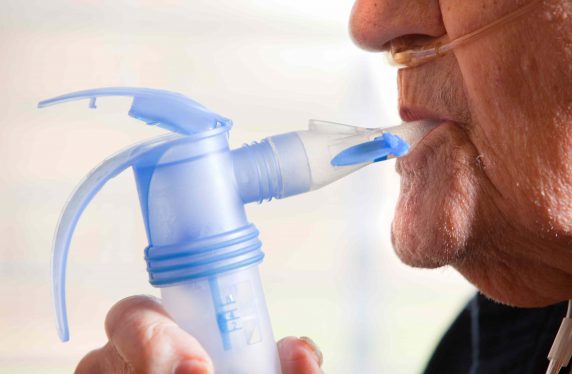GPs should advise patients with chronic obstructive pulmonary disease (COPD) not to self-start a course of corticosteroids or antibiotics if they develop symptoms of coronavirus (Covid-19), NICE has said.
In a rapid guideline published last week on how to manage patients with COPD during the coronavirus pandemic, NICE added that GPs should not offer patients short courses of the treatments to keep at home ‘unless clinically indicated’.
GPs should also monitor the mental wellbeing of COPD patients and encourage those with ‘more severe’ COPD to have advance care plans in place.
The guideline said: ‘Tell patients not to start a short course of oral corticosteroids and/or antibiotics for symptoms of Covid‑19, for example fever, dry cough or myalgia.
‘Do not offer patients with COPD a short course of oral corticosteroids and/or antibiotics to keep at home unless clinically indicated, as set out in the NICE guideline on chronic obstructive pulmonary disease in over 16s.’
However, patients should still follow their individualised COPD self-management plan and begin a course of oral corticosteroids and/or antibiotics ‘if they think they are having an exacerbation’, it added.
The guideline also said that patients should continue taking their regular oral and inhaled medicines as prescribed – including corticosteroids, oxygen therapy and prophylactic antibiotics – to ensure their COPD is ‘as stable as possible’.
This includes COPD patients who are confirmed or suspected to have coronavirus, it added.
If there is a ‘new’ reason to stop antibiotic treatment such as side effects or an allergic reaction, GPs should advise patients to contact their care team, NICE said.
Meanwhile, GPs should explain to patients that there is ‘no evidence’ that inhaled corticosteroids (ICS) increase coronavirus risks to those with COPD and delay any planned trials of ICS withdrawal, NICE said.
It added: ‘While there is some evidence that use of ICS in COPD may increase the overall risk of pneumonia (see the 2014 MHRA drug safety update on inhaled corticosteroids: pneumonia), do not use this risk alone as a reason to change treatment in those established on ICS and risk destabilising COPD management.’
Other recommendations include:
- Do not routinely start prophylactic antibiotics to reduce coronavirus risk.
- Advise patients taking long-term oral corticosteroids to carry a steroid treatment card.
- Advise patients receiving ambulatory oxygen not to start using it in their home or at rest.
- Prescribe enough COPD medicines to ‘meet the patient’s clinical needs’ for a maximum of 30 days to avoid putting the supply chain at risk.
- ‘Strongly encourage’ COPD patients who are still smoking to stop.
- Monitor patient’s mental health and wellbeing, including being ‘alert’ for new or increased anxiety or depression.
- Signpost patients to charities such as the British Lung Foundation and support groups such as the NHS Volunteer Responders, as well as Government guidance.
- Find out if patients have advance care plans, including ‘do not attempt cardiopulmonary resuscitation’ decisions, and encourage those with ‘more severe’ COPD who do not have advance care plans to develop one.
- Factors associated with a ‘worse prognosis’ in patients with COPD include a past history of hospital admission, ‘limiting’ breathlessness, frailty and multimorbidity and a need for long-term oxygen therapy or non-invasive ventilation.
NICE rapid guideline on COPD management during Covid-19 pandemic
Self-management for exacerbations:
- Tell patients that if they think they are having an exacerbation, they should follow their individualised COPD self-management plan and start a course of oral corticosteroids and/or antibiotics if clinically indicated.
- Tell patients not to start a short course of oral corticosteroids and/or antibiotics for symptoms of Covid‑19, for example fever, dry cough or myalgia.
- Do not offer patients with COPD a short course of oral corticosteroids and/or antibiotics to keep at home unless clinically indicated, as set out in the NICE guideline on chronic obstructive pulmonary disease in over 16s.
Treatment
- Tell all patients to continue taking their regular inhaled and oral medicines in line with their individualised COPD self-management plan to ensure their COPD is as stable as possible. This includes those with Covid‑19, or who are suspected of having it. Keep their self-management plan up to date, and remind them that online video resources on correct inhaler technique are available.
Corticosteroids
- Explain to patients there is no evidence that treatment with inhaled corticosteroids (ICS) for COPD increases the risk associated with Covid‑19.
- Tell patients established on ICS to continue to use them, and delay any planned trials of withdrawal of ICS. While there is some evidence that use of ICS in COPD may increase the overall risk of pneumonia (see the 2014 MHRA drug safety update on inhaled corticosteroids: pneumonia), do not use this risk alone as a reason to change treatment in those established on ICS and risk destabilising COPD management.
- Tell patients on long-term oral corticosteroids that they should continue to take them at their prescribed dose, because stopping them can be harmful. Advise patients to carry a Steroid Treatment Card.
Oxygen
- Advise patients currently receiving long-term oxygen therapy not to adjust their oxygen flow rate, unless advised to by their healthcare professional.
- Advise patients currently receiving ambulatory oxygen not to start using it at rest or in their home.
Oral prophylactic antibiotic therapy
- Do not routinely start prophylactic antibiotics to reduce risk from Covid‑19.
- Tell patients already prescribed prophylactic antibiotics to continue taking them as prescribed, unless there is a new reason to stop treatment (for example, side effects or allergic reaction). Advise patients to contact their care team if this happens.
Source: NICE
Visit Pulse Reference for details on 140 symptoms, including easily searchable symptoms and categories, offering you a free platform to check symptoms and receive potential diagnoses during consultations.












